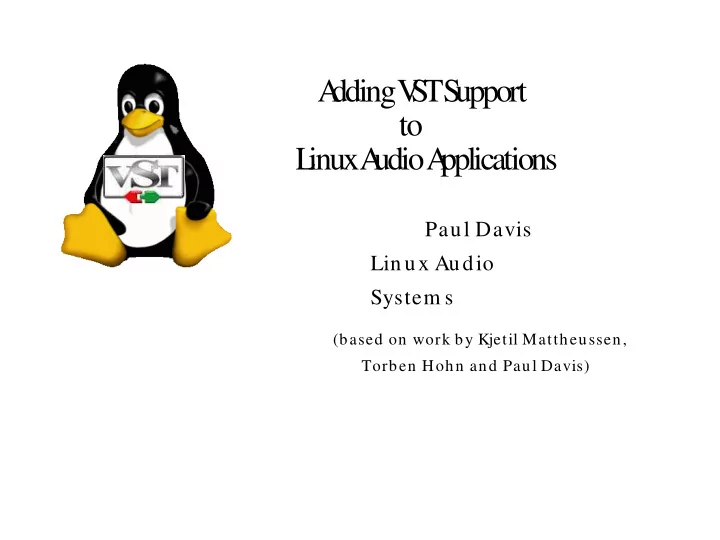

A dding V S T S upport to L inux A udio A pplications Paul Davis Lin ux Audio System s (based on work by Kjetil Mattheussen, Torben Hohn and Paul Davis)
What is VST? ● Technology from Steinberg ● An audio/MIDI plugin API ● Support for win32/x86, MacOS9, MacOS X ● Plugins roughly divided into a DSP core and an optional customized GUI
The Problem ● VST plugins for Windows are packaged in a win32/x86 file format ● VST plugins for Windows make win32 API calls ● Linux does not (natively) support either of these.
The Solution ● Wine ● WINdows Emulator? ● Wine Is Not an Emulator? ● Wine provides 95%+ of the win32 API by translating it into native linux library and OS calls. ● Traps systems calls, exceptions ● 1,000,000+ lines of code, +25%/month
The Problem, Part II ● Wine is intended for running win32 programs ● We have win32 plugins ● We want to use them in a native Linux application ● We are not alone: Mono, game people using DirectX, others.
The Kjetil is not Black ● Kjetil Mattheussen did the first open source implementation of VST support ● Created a win32 application ● Compiled it with winebuild ● Result: a native Linux app that can load win32 .dll's (VST plugins) ● Connect to other Linux programs with a client/server protocol
VSTserver Features ● Isolates VST and win32 code from host ● Plugin can crash without affecting the host ● Plugin cannot access host data structures ● Sweet! ● But ...
Problems with VSTserver ● 2 context switches to run a plugin's process() callback ● Doesn't scale ● Imagine a session with 2-4 plugins on most of 24 tracks.
A Different Approach ● Run VST plugins in the same process as the host ● Must be able to load and run win32 code ● Don't use wine(1) or winebuild ● Mono's shared wine hack
Mono and setjmp WinMain () { longjmp (jmpbuf, 1); } if (setjmp (jmpbuf) == 0) { wine_init (“run me”); /*NOTREACHED*/ } ... now have a win32-ready thread...
The Problem, Part III ● The Mono hack doesn't support threads ● All audio apps require threads ● Therefore ...
Win32 Thread Ugliness ● All thread systems need some way to identify the current thread ● win32/x86 uses the %fs register ● for comparison, NPTL and later linuxthreads use %gs ● Contents point to a block of information allocated from the processor Local Descriptor Table (LDT) ● Any thread running win32 must have %fs point to a valid LDT entry
Ugly? Or Just Windows? ● Wine takes over thread management ● Wine starts before the application ● With a native Linux application, there are threads created using the native thread API ● Wine doesn't know about these threads, thus %fs is not set up ● wine_adopt_thread ();
How We Do It ● Allocate a special proxy thread when wine is started, using win32 thread API ● Thread waits for notifications of new linux threads ● Tells Wine about them, passes back %fs information ● Linux thread has %fs set, can now execute win32 code.
The GUI ● Most VST plugins come with their own custom editor ● Native win32 or vstgui calls – its all the same to us ● Need an entire win32 event loop running the host. ● Window management ...
Window Management 1 ● the win32-created window has no WM “decoration” ● the win32 thread is an Xwindow, but no X toolkit knows about it ● linux apps can't manage it as if it was a normal toolkit window ● we need to “adopt” the window ● XReparentWindow
Window Management 2 ● we wait for the window to be created ● use whatever wrapper around XReparentWindow a toolkit provides ● for GTK+, GtkSocket, gtk_socket_add_id(), gtk_socket_steal() ● ideally, use XEMBED extension ● not supported by wine
Window Management 3 ● after reparenting, when the window is moved, the win32 GUI layer doesn't know ● coordinates of mouse events are wrong ● have to forward the correct kind of XEvent to the win32 layer ● in GTK+, catch “configure” events, synthesize a new XConfigure event, send to the XWindow underlying the win32 window.
Writing a Host ● you need to: ● (1) supply an “audioMaster” callback to handle requests from the plugin ● (2) probably augment the FST data structures with something application specific (think LADSPA) ● (3) take care of window management (configure events, etc.)
Plugin Discovery ● Suprise – its really slow (loading multiple win32 .dll files) ● “fstconfig” builds caches of basic VST plugin info in foo.fst ● fst_get_info (dllname) will get (and if necessary re-build) info for a .dll ● much, much, much faster ● LRDF?
The API fst_init (); fst_load (); fst_unload (); fst_instantiate (); fst_close (); fst_run_editor (); fst_destroy_editor (); fst_get_info ();
Success Stories ● Kontakt, Battery from Native Instruments ● Crystal ● Lots and lots of small, interesting and useful plugins
Problems ● where to begin?
Without Whom ● Torben Hohn ● Kjetil Mattheussen ● The Mono crew for getting us started ● Alexandre Julliard, Mike Hearns, Mike McCormack and Chris Morgan of the Wine project for advice and guidance. ● Smartelectronix for open source plugins. ● Steinberg. Hmm. Yes.
Recommend
More recommend